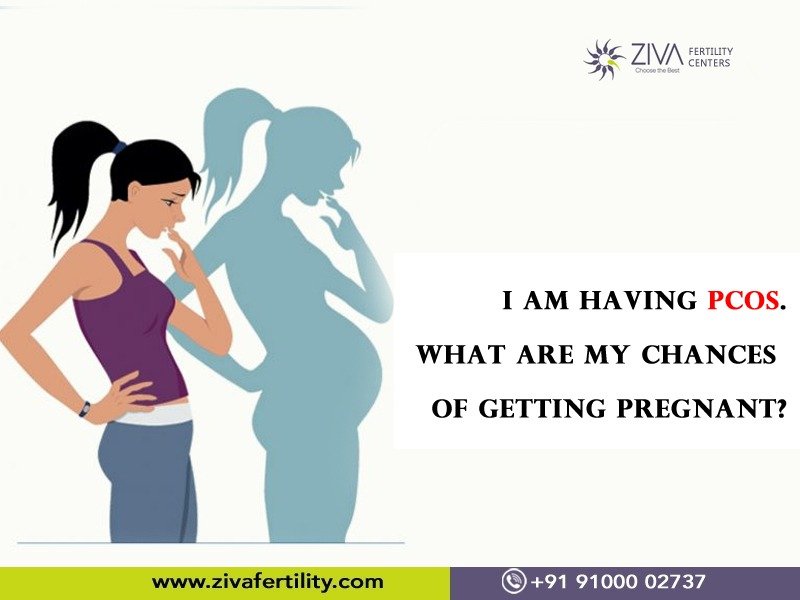Polycystic ovary syndrome (PCOS) is a hormonal condition that is one of the leading causes of female fertility issues. Around 50% of women have this condition, which is not so easily detected. But there is good news: effective treatments are available, and there are steps that one can take to improve your chances of pregnancy if you have PCOS.
Polycystic ovary syndrome, or PCOS, is a hormonal condition that you might first get diagnosed when you’re trying to get pregnant. It is difficult to get pregnant if PCOS is not treated. You may need extra help, but pregnancy is still achievable. Many things are in your hand, and you can do them at home. Medical treatments are offered to keep PCOS symptoms at bay, which raises your chances for a healthy pregnancy.
Why is it difficult to get pregnant with PCOS?

PCOS can impact your menstruation cycle (your monthly period), and other symptoms include:
- Irregular menstrual periods
- Prolonged periods
- Missing periods
- Heavy bleeding during periods
- More presence of testosterone
- Acne breakout on the skin
- Facial hair and extra hair on the body
- Cyst formation and fluid in the ovaries
- Less number of eggs are released from the ovaries
Complications with PCOS are
- Infertility
- Type 2 diabetes
- Sleep apnea
- Heart disease
- High blood pressure
- High cholesterol
- Stroke
The exact cause of PCOS is not known. There are no specific causes to pinpoint that could have caused you to have this condition. If you see period abnormalities, please get an early diagnosis and treatment and make other lifestyle changes. These steps will help you get pregnant and prevent health complications from PCOS.
How to get pregnant with PCOS?
Track your ovulation
Tracking your ovulation is one of the best ways to determine your fertility window. Many apps help you track your ovulation. Some of the other methods are:
- The basal temperature chart method, where the body temperature is measured, and the basal body temperature increases around the ovulation period.
- Checking for cervical mucus which becomes thin like egg white around ovulation.
- Saliva testing method where a small saliva drip is placed on the test kit. After the saliva dries up, the sample is examined under a microscope to see if crystals have been formed, which is expected around ovulation.
- If your periods are regular, you can use a simple calendar method to determine your ovulation dates.
- The couple should have intercourse around the ovulation period, preferably 2-3 days before it and on the day of the ovulation.
Maintain a healthy blood sugar level: If sugar levels are normal, one can expect a healthy pregnancy. So, if you have diabetes, please make sure that you keep it in control. See your doctor to make sure your blood sugar levels are balanced. Your blood sugar levels are essential in getting pregnant and carrying it to full term.PCOS changes how your body uses insulin, the vital hormone to move sugar (glucose) out of the blood and into the muscles and cells, which are burned for energy. PCOS reduces insulin sensitivity, thus increasing blood sugar.
If the traditional methods of diet and exercise are not working, your doctor might recommend medications to help balance your blood sugar levels. Even if you are taking medicines, do not neglect a healthy diet and exercise. Monitor your blood sugar levels using at-home kits so that you can modify your diet accordingly.
Healthy BMI:
Maintain a healthy BMI, which means a healthy body weight and body composition of fat. Many beneficial methods are available for shedding those extra kilos and talking to your doctor about how much weight you need to lose before you get pregnant. By reducing 5% of the body weight, one can see improvements in PCOS symptoms.
The starting points are a healthy diet and regular exercise. Lead an active life and choose more nutritious food choices.
Yoga: Specific yogic postures(asanas) have been shown to reduce the effect of PCOS. So, if you have been diagnosed with PCOS, please start yoga at the earliest and do not wait for pregnancy time. The longer one does yogic practices the better the benefits are.

Daily healthy diet: Whether you have PCOS or not, any woman who is trying to conceive should have a good diet. Make the following dietary changes as part of your routine:
- Switch out sugary foods, simple carbs, and unhealthy fats for healthier choices
- Fresh and cooked fruit and vegetables
- Whole grains like brown rice, oats, and barley
- Beans and lentils
- Chicken
- Fish
- Prenatal vitamins for a healthy pregnancy and a growing baby. Please take them only after consulting your doctor. Most doctors will suggest you bring:
- Folic acid (vitamin B9)
- Vitamin B6
- Vitamin B12
- Vitamin C
- Vitamin D
- Vitamin E
- Coenzyme Q10
Medications: If you have PCOS, it means your body is producing more of the male hormone testosterone and the female hormone estrogen. Excess or deficit of both these hormones can make it tricky to get pregnant. So, medications are prescribed to help balance your hormones. Medications could be for:
- Balance insulin levels
- Balance estrogen levels
- Birth control pills to balance estrogen and testosterone levels (before the start of fertility treatment)
- Fertility medications to stimulate ovaries to send out more eggs
Fertility treatments: In vitro fertilization (IVF) treatments help you get pregnant with PCOS. One good news is that medical research shows that women with PCOS have a high success rate of getting pregnant with IVF treatment. Your doctor will give you other medications to help balance hormones and get your body ready for IVF treatment.
Even for IVF to succeed, women should eat a balanced diet and get plenty of exercise to reach a healthy weight. Women with PCOS who are a healthy weight have double the chances of getting pregnant with IVF than obese women with PCOS. IVF is an expensive technique, so we at ZIVA Fertility Center first suggest a less costly alternative called intrauterine insemination (IUI). IUI increases the chance of pregnancy because it directly injects a high concentration of sperm closer to the egg.
We at ZIVA Fertility Clinics have helped numerous women with PCOS get pregnant. At ZIVA Fertility clinics, you should be optimistic and follow our guidelines. A calm and relaxed mind will help you achieve your PCOS goals quickly.
For more information, please visit our website https://zivafertility.com/ or contact us at +91-9100002737 or +91-9392834024.


















